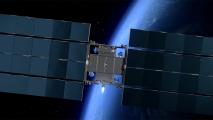Phantom Space, a startup founded by SpaceX veteran Jim Cantrell, is taking an “off-the-shelf” approach to building rockets, using parts created by other space companies to build rockets cheaper and faster.
“We want to be the Henry Ford of the space industry with mass production, while others in this space are focused on vertically integrating their technology and supply chain,” Cantrell said in a press release.
The challenge: It’s cheaper than ever to send a satellite or even a person into space, but it’s still not cheap.
If we can get to the point that practically anyone who wants access to space can afford it, though, it could be a major boon for science, entertainment, and more.
“Space tourism, materials development, pharmaceutical research, power generation, communications, earth imaging, and national security all have ‘killer apps’ just waiting for reliable and affordable access to space,” Greg Autry, a commercial spaceflight expert, wrote in 2017.
The Phantom Space way: Most space companies, from SpaceX to Virgin Orbit, design and build their rockets in-house, and that development cost gets passed down to customers.
Cantrell doesn’t see a need for every part of a Phantom Space rocket to be built by his company, though: “F1 (racing teams) don’t build their own engines; they buy them,” he told Tucson.com in November.
So, rather than spending time and money making bespoke rocket parts, Phantom Space is sourcing proven technologies from other space companies.
“At Phantom, to achieve rapid time to market and enabl(e) mass manufacturing, we are leveraging mature supply chains in addition to our own innovations,” Cantrell said in the press release. “This allows us to get to orbit faster than ever thought possible.”
Instead of developing engines for its first rocket, the Daytona-E, in house, Phantom Space is buying them from Denver-based aerospace company Ursa Major Technologies — a move that’s saving the company $50 million and five years in development, Cantrell told Bloomberg.
The price: Phantom Space expects to charge about $4 million per Daytona launch. The rocket will be able to deliver a max payload of 1,000 pounds to low-Earth orbit, so that’ll be about $4,000 per pound.
This allows us to get to orbit faster than ever thought possible.
Jim Cantrell
SpaceX’s Falcon 9 can carry a much larger payload at a much lower cost (about $1,200 per pound), but those launches cost $62 million.
Customers who can’t afford a dedicated launch can wait for one of SpaceX’s rideshare missions, but the Daytona could give customers a relatively affordable way to reach space on their terms.
Phantom Space has yet to launch a single rocket, but it did just secure a $5 million investment that could help bring its goal of a 2023 Daytona launch to fruition.
We’d love to hear from you! If you have a comment about this article or if you have a tip for a future Freethink story, please email us at [email protected].






